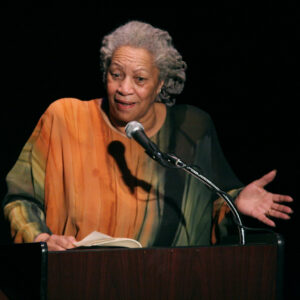
Michael Wiegers Remembers Jim Harrison
He wrote us all into this world and made us a part of it
For nearly two decades I’ve kept four small boxes in my office, filled with the foul matter—the marked-up paper manuscripts and proofs-—for Jim Harrison’s The Shape of the Journey: New & Selected Poems. The boxes are stuffed with pages which are in turn filled with multi-colored marginalia: scrawled arguments about spelling, cranky assertions of poetic intent, surprising doodles, even instances of “Lil’ Jimmy” occasionally expressing glee upon discovering his own mistakes without any editorial prompting. Many voices enter the conversation—editors, proofers, designers, quotes from other writers—and more often not Jim agrees with them, although occasionally with a few well-chosen fricatives to keep people in line. (There are even a few pages that have been accidentally chewed by one editor’s pet rabbit: there’s always a critter not too far away in a Harrison book.) But among all the marginal chatter, the voice that asserts itself throughout is Harrison’s—difficult, robust, mischievous, joyful, argumentative, excessive and fully engaged.
Nowadays I primarily use these materials to help teach new interns and younger editors about how the editorial process works and how we make a book. But it’s also a reminder of a type of editing and publishing that sometimes goes missing in the digital age. That original book manuscript for Shape of the Journey was quite a mess—drawing upon several collections from different publishers and editors, there was a wildness and devil-may-care sensibility to it all—and when I look at it now, I see that we were always trying to corral a beast. More importantly for me, Jim was teaching us how to edit and publish books. Perhaps hearkening to a different era, the materials in those boxes are meaningful artifacts from a different way of doing things. I learned a lot from that initial work with Jim, and even today Copper Canyon Press and its poets are the direct beneficiaries of the theories and practices forced by Harrison. Jim made Copper Canyon Press a better publishing house—encouraging us to think bigger, be smarter at marketing and promotion, and stepping into the role of thorough and attentive editing. Maybe he drew people to him precisely because his methods were rough. He wrote his poems out longhand, and then would fax them to his beloved assistant Joyce Bahle—who kept him and his literary affairs going for many years. She would then type them, and during past decade or so, she would send the poems out to a small list of friends immediately. You got the sense that Jim was working hard on his own obsessions and ruminations and it was imperative that we all pay attention: now. I remember once when planning an upcoming book I’d told him that we could get a new manuscript published in a year and a half, he responded curtly, “I’d rather throw it in a Nogales ditch.” There would be only so much taming. Later, whenever we had received a substantial number of these emailed poems, I’d huddle up with Joseph Bednarik and suggest, “seems like we have enough for book?” Joseph always had a deft, and most insightful hand with Harrison, since that first moment when, as a young, ponytailed vegetarian he’d asked the balding, meat-eating bear a question from the audience at one of his readings. They became best of friends for many years. Friendship seemed to be everything to Harrison, and it motivated him, as is seen in his work on Sumac magazine with Dan Gerber, or his collaborative book with Ted Kooser, all of whom would share their faxed poems with one another.
As the obituaries for Jim Harrison are written, much will be made of his tales of excess—the extended dinners, the infamous relationships and flirtations, the fights, the skyrocketing fame and the literary failures, the emptied bottles and clouds of smoke. While I have a degree of admiration for the sort of abandon that Harrison mentored both in his writing and in his life, I think that for many of his friends, there was also a boyish tenderness, curiosity and sense of adventure that we all loved and which was sometimes unfortunately lost among the more grandiose excesses:
Who
was I, half-blind on the forest floor
who was I at age seven? Sixty-eight
years later I can still inhabit that boy’s
body without thinking of the time between.
Harrison’s excesses cast shade on his intellectual curiosity and deep knowledge, at the same time they reveal stories that are sometimes fun and funny for others to tell. But the magnums of wine, the unending food, the smoke-clogged rooms and provocations seem to me besides the point. They are just further incitements toward kinship and more storytelling and being of the human world. He used to joke about how his mother saw through his capacity to fib, and how one day it would get him places, make him rich. His “fibs” certainly led him to great dinner camaraderie. For Harrison, his most important work was done while sitting on a log or watching animals, but he also valued the work done in the pages of a book or around a table of food. His invocations to solitude notwithstanding, I believe he also had an intense and fundamental desire to learn how to be of humankind, while digging in to resist its mundanities. He wanted to be like Machado, and Lorca, and, Keats, and Yesenin, and Mandelstam—his heroes. His love of this world shows in poems empathetically filled with those who died too young—the girl in the river, the poets executed, the lost wife: “There is a place in us to weep for others,” he says in one of his newer poems,
the memories so fresh you could smell the pain
within is dark and raw. This great sprawl of sick people craving the
outside, to walk in a forest beside a lake, the air full of birds in the
greenery. Saint Francis dozing against a tree, a yellow warbler perched
on his shoulder. There is no way out of this prison we have built so
clumsily, hellish in its ugliness. Most of us want to stay. I can’t die
when I want to go back to Narbonne and my secret room where I
write so much.
Jim Harrison wrote us all into this world and made us a part of it. There are none like him; he contained multitudes.
Watch: A few months before Jim Harrison’s death, Grove Atlantic associate publisher Judy Hottensen was able to spend the day with the award-winning writer.
Michael Wiegers
For the past decade Michael Wiegers has worked in independent publishing as an editor, and is currently the Editor in Chief of Copper Canyon Press. His reviews and criticism have appeared in American Poetry Review, Publishers Weekly, Rain Taxi, The City Pages, The St. Paul Pioneer Press, Portlandia, among other publications. He has edited three anthologies: Reversible Monuments: Contemporary Mexican Poetry, The Poet’s Child, and This Art: Poems on Poetry.



















